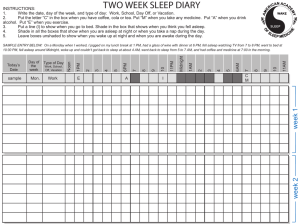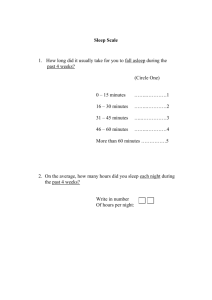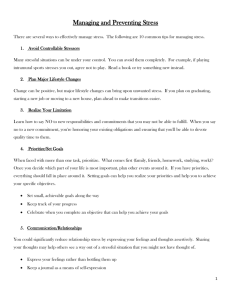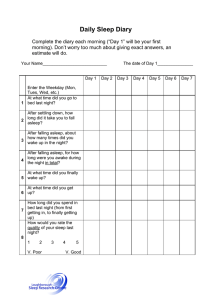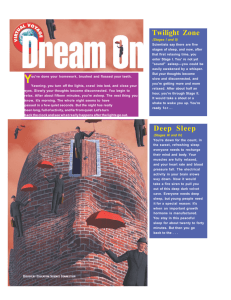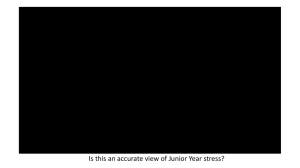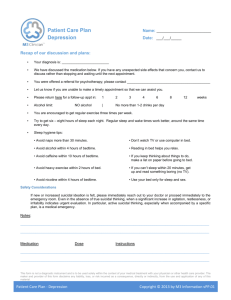Stress Management Quiz
advertisement
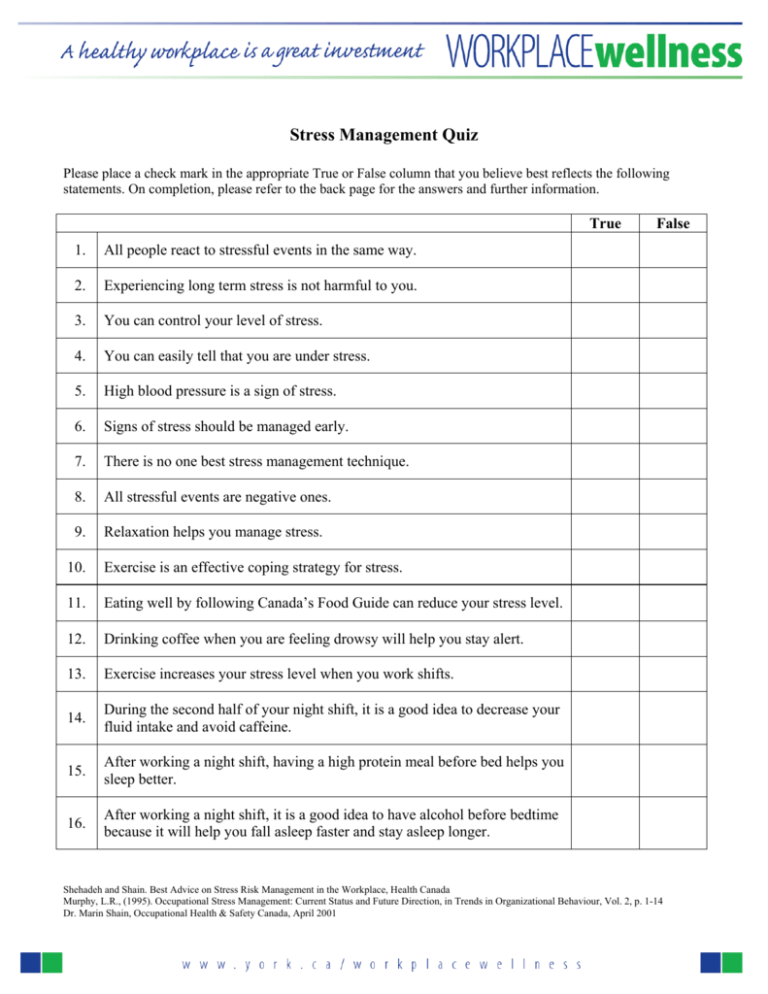
Stress Management Quiz Please place a check mark in the appropriate True or False column that you believe best reflects the following statements. On completion, please refer to the back page for the answers and further information. True 1. All people react to stressful events in the same way. 2. Experiencing long term stress is not harmful to you. 3. You can control your level of stress. 4. You can easily tell that you are under stress. 5. High blood pressure is a sign of stress. 6. Signs of stress should be managed early. 7. There is no one best stress management technique. 8. All stressful events are negative ones. 9. Relaxation helps you manage stress. 10. Exercise is an effective coping strategy for stress. 11. Eating well by following Canada’s Food Guide can reduce your stress level. 12. Drinking coffee when you are feeling drowsy will help you stay alert. 13. Exercise increases your stress level when you work shifts. 14. During the second half of your night shift, it is a good idea to decrease your fluid intake and avoid caffeine. 15. After working a night shift, having a high protein meal before bed helps you sleep better. 16. After working a night shift, it is a good idea to have alcohol before bedtime because it will help you fall asleep faster and stay asleep longer. False Shehadeh and Shain. Best Advice on Stress Risk Management in the Workplace, Health Canada Murphy, L.R., (1995). Occupational Stress Management: Current Status and Future Direction, in Trends in Organizational Behaviour, Vol. 2, p. 1-14 Dr. Marin Shain, Occupational Health & Safety Canada, April 2001 Stress Management Quiz Answers Answer 1. Each individual reacts to stressful events differently based on their previous experience and coping ability. What may be overwhelming for one person may not be stressful to someone else. False 2. Severe or chronic stress can result in increased risk for a variety of diseases, e.g. heart disease, high blood pressure, stroke, cancer and depression. False 3. Whether or not you have control over the situation that is causing you stress, you can have control over your reaction to the situation. True 4. 5. Sometimes we miss the signs and symptoms of early stages of stress until they become severe. Occasionally, others may see and comment on the signs of stress in us before we do. High blood pressure is a common physical sign of stress. False True 6. Under long term stress, signs and symptoms can progress from warning signs to mild and then severe signs that need medical attention. Stress should be managed early before the signs and symptoms become severe and difficult to treat. True 7. Different techniques work differently for different situations or individuals. One must use the techniques that work best for him/her. True 8. Pleasant events such as promotions, vacations and marriage are also stressors since they require many adjustments and place demands on the person. 9. Relaxation calms the body and the mind thus relieving the signs and symptoms of stress. 10. 11. Exercise alters the way the body handles stress and it improves one’s sense of wellbeing. It helps to release muscle tension and the accumulation of stress hormones and also improves the ability to relax and sleep. Nutritional needs increase during times of stress. Making healthy food choices, e.g. vegetables and fruits, will ensure your body has the nutrients it needs to meet the challenges of coping with stress. Follow Canada’s Food Guide. False True True True 12. Caffeine may help you stay awake, but it will not increase your level of alertness. If you are very tired, you will still fall asleep. Sleep is not voluntary. False 13. Exercise helps extend the deepest level of sleep when the body repairs itself and replaces vital body chemicals. Exercise improves physical fitness, therefore increasing energy and alertness on the job. Exercise can be fun and is a great way to relieve stress. False 14. Drinking fluids before bedtime may disturb your sleep with frequent trips to the bathroom. Caffeine is a stimulant and will keep you awake. 15. Try to avoid large amounts of high protein foods before going to bed. Protein raises your body temperature and increases energy and alertness. False 16. Drinking alcohol before sleeping helps you fall asleep faster, but prevents you from going into the deeper stages of sleep, so you wake up feeling tired. False For more information on Workplace Stress Management, please call York Region Health Connection at 1-800-361-5653 TTY 1-866-252-9933 True
